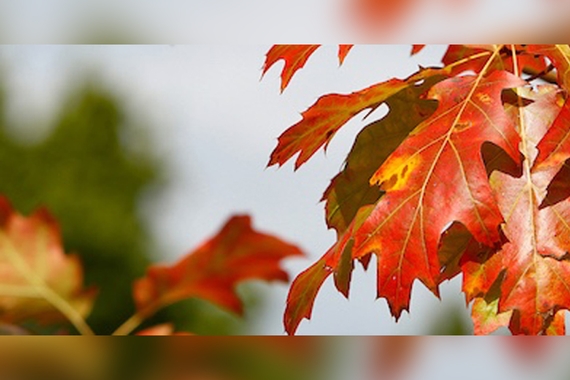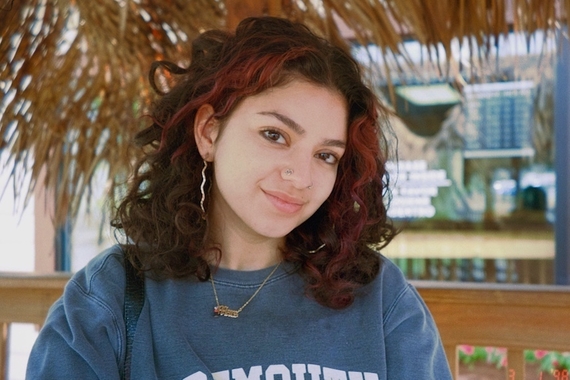Gabriela Spears-Rico: The Catalyst of a Poet
“I found beauty through my poetry,” says Gabriela Spears-Rico, “and that gave me the resilience I needed—not to survive, but thrive.”
A cultural anthropologist, Assistant Professor Spears-Rico has surrounded herself with her community and fellow Indigenous people her entire life. Spears-Rico shares twenty years of memories and connections in her forthcoming poetry collection, Deer Hide Elegies. Not only does it represent a culmination of Spears-Rico’s life experiences so far, but it also reflects the lives of her fellow Indigenous people and their perseverance and struggle for equity.
In Strawberry Hands
Spears-Rico grew up in a Mexican migrant community in Santa Maria Valley where many of her family members and neighbors worked in strawberry fields. They were a tight-knit group, sharing spaces and shoulders to lean on as they navigated the tough conditions of being farmworkers. “There’s a beautiful field of intimacy and community that comes with that,” Spears-Rico states.
A child of Pirinda Charense heritage on her father’s side, and a P’urhepecha descendant on her mother’s side, Spears-Rico was always connected to her Indigenous lineage. And, as the oldest child, she took on many responsibilities from day one to support her family. “I became like another parent for my siblings,” Spears-Rico admits, “and I didn’t feel like I had an outlet for understanding my experiences on my own terms. So I started writing to carve out that space for myself.”
At a young age, Spears-Rico’s mother noticed her talent for writing. To foster it, they worked with a migrant education program to keep track of her work and encourage her creativity. “They told my mom that it’s healthy to have this kind of expression,” Spears-Rico says, “but that it’s also a good practice for literacy.”
Call for Justice
Spears-Rico saw a lot of happiness in her community. But she also saw a lot of strife. Undocumented migrant farmworkers often have dangerous and physically demanding jobs and risk mistreatment or discrimination due to their status. “I witnessed my mother walk out of the fields in protest when water breaks and bathroom breaks were denied to her crew of workers,” Spears-Rico writes, “and I think seeing that helped me understand the call for justice.”
Spears-Rico didn’t hesitate to answer the call as she advocated for her fellow Indigenous people and people of color through protests, alliances, and organizations. Also active in the Latino, Native American, and Black communities during her time as a student at Stanford, she was introduced to many other poets and activists of color. “I learned a great deal,” Spears-Rico says. “I got to grow in my ethnic studies education and formed many lifetime connections there.”
Catalyst of Everything
Spears-Rico has been publishing her work since middle school, but Deer Hide Elegies will be her first official collection. Not long ago, Spears-Rico applied for the Bougainvillea Poetry Prize, offered by FlowerSong Press, an organization that focuses on lifting up “the voices of those from Latin America, the USA, and all over the world.” Through this competition, she won an opportunity to publish her collection.
“I think that’s why I continue to submit my work to get into anthologies, into museums—to be performed, read, exhibited and published,” she says, “this collection is going to be the catalyst of everything coming together.”
Deer Hide Elegies is a multilingual collection, featuring poems like “Strawberry Hands,” a piece inspired by a farmworker who had permanently stained his hands purple and red from harvesting strawberries. It’s a blend of her past and present. The poems are inspired by her connections with her community, culture, and friends. Some pieces act as eulogies and legacies for the activists that Spears-Rico had come to know growing up.
“I think the theme that weaves it together,” Spears-Rico says, “is death and renewal. As an anthropologist, I’ve come to understand death as a renewal, so it's a collection about renewal—about healing—and my own personal journey, but also the journey I’ve always had in the community.”
Beauty in the Reemergence
Thanks to her efforts, Spears-Rico was awarded the NDN Radical Imagination Grant, an award for ten Indigenous artists and culture bearers in their mission to “defend, develop, and decolonize.” The grant supports Spears-Rico’s work as a poet, but it will also aid in advancing her dreams of holding poetry workshops in her community and publishing a zine in Mexico. “It’s been a blessing,” she says, “and I feel like it’s been the culmination of all my years as an artist and poet.”
Spears-Rico has been inspired by many, both in her poetry and in her career as a cultural anthropologist. But her plans don’t end with publication; they’ve only just started. “Survivance is possible,” she reflects, “and there can be beauty in the reemergence.”

